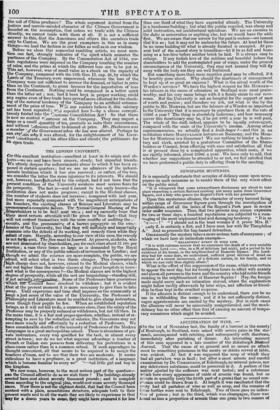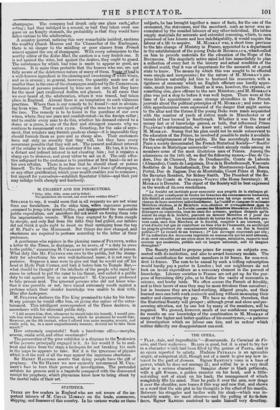ADULTERATION OF WINE.
f ON the 1st of November last, the family of a baronet in the county{ (of Roxburgh, in Scotland, were seized with severe pains in the sto-I mach, accompanied with retching, and subsequently with diarrhcea, ' immediately after partaking of dinner. An interesting account of this case appeared in a late number of the Edinburgh Medical Journal. That the cause of so general and so severe an attack must be something poisonous in the meats or drinks served at table, was evident. At first it was supposed the soup of which they had all partaken was in fault; but after a most minute and careful examination by Dr. CHRISTISON, of Edinburgh, no mineral poison, nor any deleterious substance, could be perceived in it. A portion of the matter ,ejected by the sufferers was next tested; and a substance which bore every appearance of oxide of arsenic was found, but so nonute in quantity (only'the 250th part of a grain) that no sound con- eusion could be drawn from it. At length it was recollected that the rIrty had all partaken of wine as well as soup, and the remains of three bottles were sent to Edinburgh. Two of these gave no indica- tion of poison ; but in the third, which was champagne, there was found no less a proportion of arsenic than one grain to two ounces of champagne. The company had drunk only one glass each, after esting ; had they indulged in a second, or had they taken even one glass on an !empty stomach, the probability is-that they would have fallen victims to the adulteration.
A country journal, noticing this very remarkable incident, cautions the wealthy (thank Heaven and the Chancellor of the Exchequer, there is no danger to the middling or poor classes from French wines) against the use of champagne. With every submission to the worthy editor of the Kelso Mail, the caution is a very foolish one. It is not against the wine, but against the dealers, they ought to guard. The substances by which bad wine is made to appear as good, are various. It is more than probable that the knaves who use, are not fully aware of the deleterious nature of many of them. Slear_ofleadia. a well-known ingredient in the clearing and sweetening oTivIiife-wines, 1 and so is arsenic ; in general, however, the quantity made use of is I smaller than in the case of the champagne analysed by Dr. CHRISTISON. { Instances of persons poisoned by wine are not rare, but they have ' for the most part swallowed bottles, not glassei. In all cases that we ever heard of, the adulteration, where it was traced, had taken place in England. Abroad there is no temptation to such villanous practices. Where then is our remedy to be found ?—not in abstain- ing from wine. That would be cutting off the nose to be revenged of the face. The remedy is to be found in the purchase of our own wines, where, they are pure and unadulterated—in the foreign cellar ; and to enable every man to do this, whether his demand extend to a dozen or a gross, is one of the first and strongest reasons why we continue to recommend OUR cLurt. Granting, for the sake of argu- ment, that retailers may furnish goods as cheap—it is impossible they should furnish them as pure and as cheap also. Their customers have not only no security that they will, but they have every assurance possible that they will not.. The present and direct interest of the retailer is to cheat his customer if he can. He has, it is true, a distant and indirect interest in not cheating him ; but it requires a sharp eye to discover, and great virtue to. •act.on it. The only effec- tive safeguard to the customer is to purchase at first hand—to act as his own retailer. There is no fear that he should cheat or poison himself. To the wealthy therefore we say, don't leave ofirchampagne, or any other gratification which your wealth enables you to compass ; but import for yourselves—establish Spectator Clubs—and then you
I
may indulge both cheaply and fearlessly.



















 Previous page
Previous page